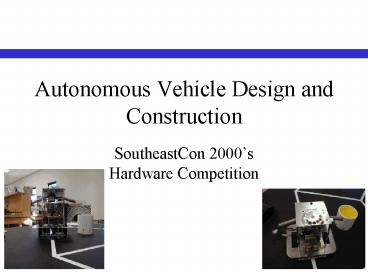Autonomous Vehicle Design and Construction - PowerPoint PPT Presentation
1 / 15
Title:
Autonomous Vehicle Design and Construction
Description:
Future Work. Redesign Line Tracking Board for general applications. Examination ... Department of Electrical and Computer Engineering, Tennessee Technological ... – PowerPoint PPT presentation
Number of Views:78
Avg rating:3.0/5.0
Title: Autonomous Vehicle Design and Construction
1
Autonomous Vehicle Design and Construction
- SoutheastCon 2000s Hardware Competition
2
Abstract
The SoutheastCon Hardware Competition is
sponsored by the Institute of Electrical and
Electronics Engineers (IEEE). SoutheastCon is the
annual IEEE Region III Technical, Professional,
and Student Conference established to bring
Electrical and Computer Engineering
professionals, faculty and students together to
share information through technical sessions,
tutorials, and exhibits. It is the most
influential event in Region 3 for promoting
awareness of technical contributions made by our
profession to the advancement of engineering
science and society. The objectives of this
project incorporate designing and building an
autonomous vehicle that meets the requirements
set forth in the rules of the competition and is
capable of performing the required tasks.
Requirements set forth in the rules include
limitations on size and weight, the presence of a
continuous bumper, and restrictions on offensive
action. To perform the required tasks the
autonomous vehicle must be capable of detecting
10kHz and 15kHz magnetic fields and 2.2kHz
modulated LEDs. This information will be used to
determine the point value of a given receptacle.
The ability to detect other robots and the
ability to reverse direction are required to
avoid collisions with the opponents robot. Armed
with the ability to gather information and
navigate the board, the robot will be able to
locate and deposit balls into infected
receptacles.
3
Team Members
Gary Harrington Team Leader
Rachel Casey Team Member
Brad Lovejoy Team Member
4
Why This Project?
- Explore Principles from Class and Textbooks
- Interest in Robotics
- Desire to Compete and Win
5
Control System
BASIC Stamp II
6
Line Tracking
- Four Inner Phototransistors
- Two Outer Phototransistors
- Multiple Sockets
7
Line Tracking
- Two outer phototransistors set direction
- Direction sets flipper
- Initially set for clockwise
8
Sensor board
Output to BS2
LED Detection Signal
Zero or 5
PIC 16F84
Square wave with received frequency
EM Field Detection
9
PIC 16F84
Start
NO
YES
YES
NO
NO
YES
YES
YES
Output to BS2 High
Output to BS2 High
Return to Start
10
Electromagnetic Field Detection
- Uses PIC 16F84 as a Frequency Counter
- Amplifier to increase detected signal
- Inverter to Stabilize Signal
11
Test Circuit
S. Benvenuti and A. Geniola, Dipartimento di
Ingegneria dell'Informazione, Univ. di Pisa,
Pisa, Italy, 1996.
12
LED Detection
- Uses Phototransistor
- Wide Detection Range
Area of Detection
13
Battery
- ENERCELL TURBO Racing Battery Pack
- Ni-Cad 7.2 volts, 1200 MAH
Total 1.47 A Battery Opt. 48 min.
(Worst Case Per 1 Item)
14
Future Work
- Redesign Line Tracking Board for general
applications - Examination of Design Flaws
- Compilation of Data for Next SoutheastCon
15
Acknowledgements and References
- Thanks to our mentor, Dr. Nail for his time and
expertise. - B. Young, IEEE SoutheastCon 2000 Hardware
Competition, http//www.tntech.edu/www/life/orgs/
ieee/SECON/intro.html, Department of Electrical
and Computer Engineering, Tennessee Technological
University, Cookeville, Tennessee, USA, 1999. - S. Benvenuti and A. Geniola, Low Cost Digital
Frequency Meter with 4 Digits Display,
http//www.iet.unipi.it/luigi/pic.html,
Dipartimento di Ingegneria dell'Informazione,
Univ. di Pisa, Pisa, Italy, 1996































